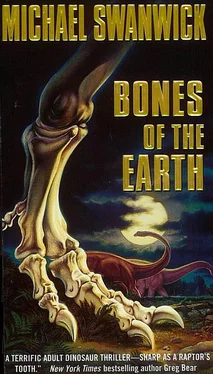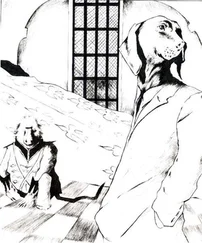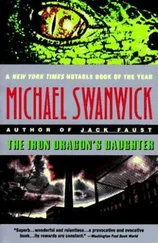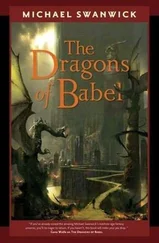until the music filled the long house like a living spirit. Outside, the night was dark and filled with the furtive scurrying of small mammals. Within, there was the warmth of friendship and good times. People traded off verses, making them up extempore, so that when Daljit sang
Why don’t you get a job with Mobil?
I hear that they pay well.
Lai-tsz replied
They’ve got great health care and pension plans,
Their profit sharing’s swell.
Then, after the break, Chuck threw out
That’s too risky, no I’ll get tenure
With my new Ph.D.
And Tamara responded with
And if triceratops don’t gore me,
I’ll have job security!
They all collapsed, laughing, on the floor. It took them a few minutes to catch their breaths afterwards.
Leyster was about to suggest another song when suddenly Katie threw her blouse in the air. Patrick cheered and clapped, and then, as if that had been a prearranged signal, everybody was shucking clothes, struggling free of trousers, frantically untying bootlaces.
Leyster opened his mouth to say something.
But Tamara, sitting beside him, touched his arm and said in a voice so soft that only he could hear, “Please. Don’t spoil it.”
For an instant, Leyster did not know how to respond. Then he began to unbutton his shirt. By the time he had it off, somebody had already undone his fly and was tugging down his trousers. He kissed Gillian long and hard, and she pressed his hand between her legs. She was already moist. He slid a finger deep inside her.
It was strange, strange, to be so intimate so suddenly with somebody he’d never romanced.
Then Patrick murmured something which might have been, “Excuse me,” and Gillian was guiding Patrick’s head down where Leyster’s hand had been. Tamara’s mouth closed over the head of his cock, and he gasped softly. Beside him, Katie thrust her breast into his mouth.
His mouth caressed her nipple. It tasted so sweet.
Then things got confused. Confused and wonderful.
* * *
At breakfast the next morning, Leyster watched the subtle dance of small, shy smiles and light, fleeting touches that passed through the group. It astonished him. He’d awakened feeling ashamed and remorseful about what he’d done. Even though he’d never been a particularly religious person, it felt wrong, a violation of the way things should be.
The others clearly didn’t feel that at all. Well, they were grad students. They were young. Their sexuality was still new to them, and malleable. They were open to new possibilities in a way that he, though almost of an age with them, could never be.
Still, it was important not to let his embarrassment show. They had finally made peace, and peace was precious. He must pretend to be as happy as they.
Sometimes deceit was the best policy.
So when Daljit squeezed his shoulder, Leyster gently leaned back against her for an instant. When Nils placed his hand on Katie’s, Leyster briefly put his hand atop both of theirs. He stayed silent, and smiled, and was particularly careful not to flinch away from anyone’s glance. He waited.
Until at last the psychologically right moment was come.
Mentally, he took a deep breath. Then he said, “I’ve been thinking about this whole leadership thing.”
Several people stiffened. Jamal said, “Well, see, I didn’t mean to…” His voice dwindled off.
“It’s not like that. This isn’t about who gets to lead. I just don’t see why we need a leader at all.” They were all watching him intently, unblinkingly. “When this was an expedition, sure, we needed somebody to divvy up chores and keep everyone on task. But things are different now. And, well, there are only eleven of us. Why shouldn’t we just get together—like we are right now—and decide things as they come up?”
“Majority vote, you mean?” Lai-tsz asked.
“No. I don’t think we should do anything unless everybody agrees on it. No dissenters, no abstentions.”
“Can that work?” somebody asked.
“A friend of mine did some linguistic work with the Lakota Sioux,” Daljit said. “She told me they were fiends for consensus. If they had a meeting to write up a press release, they insisted that everybody agree on the size of the envelopes and the color of the paper before they’d say a word about the actual content. My friend said it drove outsiders nuts. But it worked. She said that in the long run there was a lot less conflict that way.”
“That’s a lot of talking,” Patrick said dubiously.
“Well, we’ve got a lot of time,” Daljit said.
“I’m willing to cut down on my TV watching, if that’s what it takes,” Chuck offered.
A chuckle went around the circle.
Eventually, they adopted the motion by consensus. Then they moved on to the chores schedule. Grievances were aired, compromises proposed, and adjustments made. At last Jamal slapped his hands together and said, “Well, I don’t know about the rest of you, but I’ve got work to do. So if there isn’t anything else on the agenda…”
“There’s just one more thing,” Leyster said. “I think we should be doing some real science. We’ve gotten so caught up in survival that we’ve forgotten why we’re here. We came to do research. I think we should.”
There was an instant’s astonished silence. Then—
“Well, I was wondering when somebody would say that!”
“About time, too.”
“I would’ve said it myself, but—”
“Okay,” Tamara said. “We’re all agreed. Fine. So how do we do this? What are we looking for?”
Everybody turned to Leyster.
He coughed, embarrassed. The authority of superior knowledge was different in kind from the authority of assumed power. Still, he felt a little awkward assuming it.
“That’s not how it works,” he said. “Konrad Lorenz didn’t say to himself, ‘I’m going to discover imprinting in baby ducks’ and set out to gather evidence. He very carefully gathered data and studied it until it told him something. That’s what we’re going to do. Observe, record, discuss, analyze. Sooner or later, we’ll learn something.”
Patrick grinned slyly. “Yeah, but there’s got to be stuff we’re hoping, somewhere in the backs of our heads, to find out.”
“Well, obviously, there’s always the problem of why the dinosaurs died out.”
“Whopping big rock. Tidal waves, firestorms, nuclear winter, no food. End of story.”
“Crocodiles survived. Some of them were enormous. Birds survived, and cladistically speaking, they are dinosaurs. What made the non-avian dinosaurs so vulnerable to the K-T disaster? I can’t help suspecting that it’s related to the fact that during the last several million years of the Mesozoic, dinosaurs underwent a radical loss of diversity.”
“There’s plenty of dinos out there!” Katie objected.
“Lots of individuals. But compared to the old days, only a fraction the number of species. Leaving those that remain particularly susceptible to environmental change.”
“I really can’t see that,” Patrick said. “They’re so robust. They’re so perfectly adapted to their environment.”
“Maybe too well adapted. The species that die out are those that adapt themselves so perfectly to a specific niche that they can’t survive if that niche suddenly changes or ceases to be. That’s why so many species went extinct in the twentieth century, even though the kind of indiscriminate slaughter of animals that hunters engaged in during the nineteenth had pretty much ceased. When humans destroyed their habitat, they had nowhere to go.”
* * *
They talked until noon. They could afford to. The long house was built, and they had enough food stored up for a week, even without dipping into the freeze-dried stuff. More, these were still students, however far they might be from a university. They needed the reassurance of learning, the familiar cadences of lecture and debate, to restore their sense of normality.
Читать дальше






